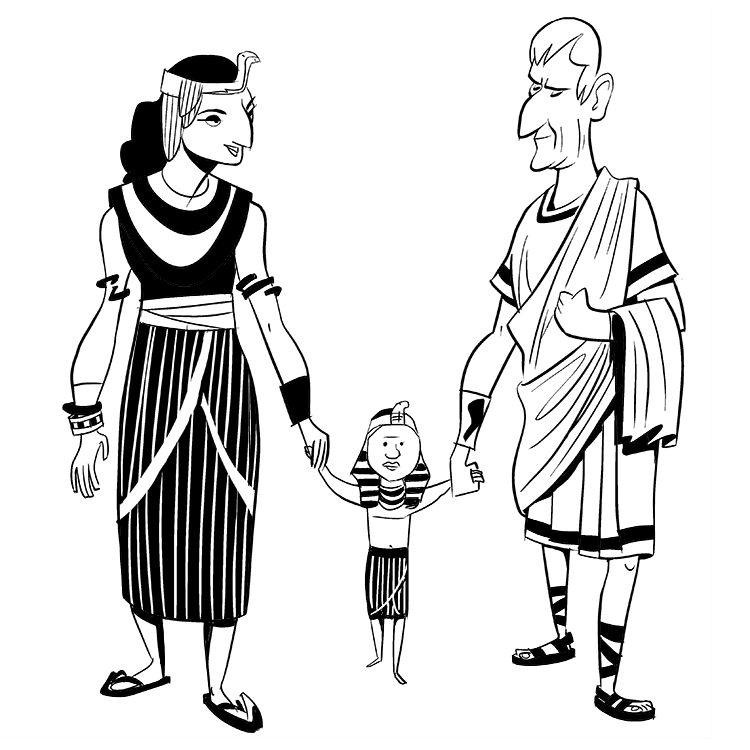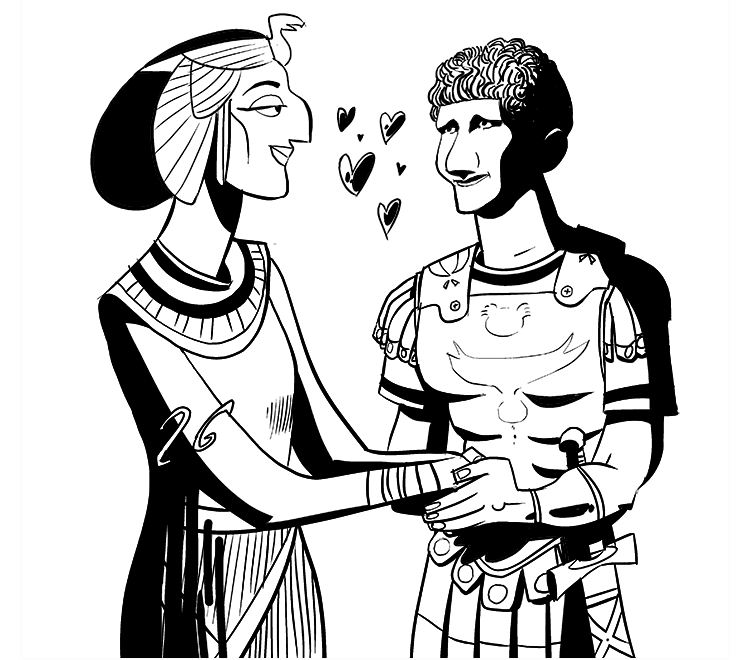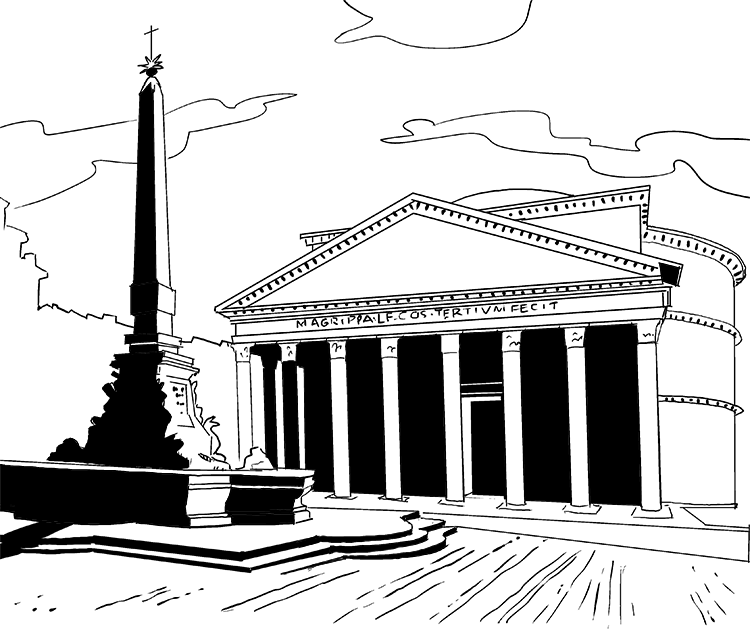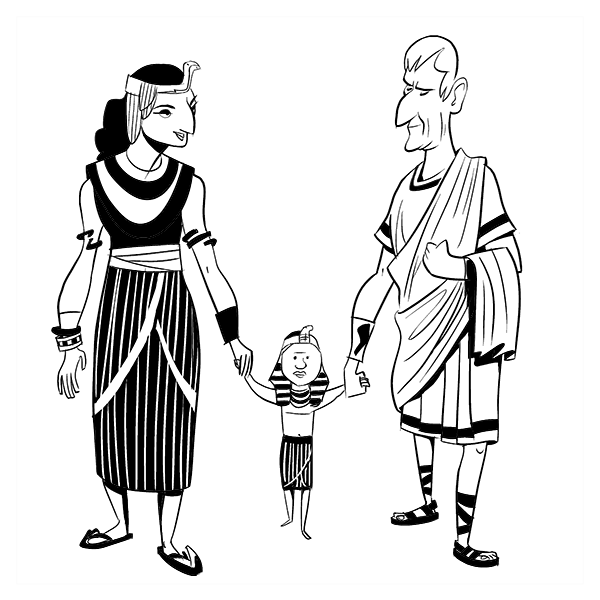Few ancient civilizations have had more of an impact on the modern world than Rome. For starters, its language, Latin, is the route for some of the most widely spoken mother tongues in the world (Spanish, French, Portugues, etc.).
Furthermore, Roman road building, military tactics, government, and later religion (mainly Christianity) reshaped the Western world and helped create the global society we have today.
But before Rome was Egypt. One of the world’s first civilizations, Egypt ruled the ancient world for more than 1,500 years and profoundly affected people living in Africa, Asia, and Europe.
So, how exactly did Egypt affect one of the world’s most influential ancient societies?

Caeser and Cleopatra
Cleopatra VII, the final queen of Egypt, married Julius Caesar. This brought the two cultures closer together than ever before.
The Fall of Egypt
Rome influenced the world so significantly because it controlled so much of it. At its peak, the Roman empire covered almost all of modern-day Europe, much of the coasts of North Africa, as well as Western Asia.
Included in this territory was Egypt, which fell to the Romans and became a Roman province in 30 BC. But the two societies had been close for nearly a century before.
The last dynasty to rule an independent Egypt, the Ptolemaics, were technically Greek. Yet they ruled as if they were Egyptians and were largely accepted by the Egyptian people.
Starting in around 150 BC, Egypt was under attack from some of the other Greek kingdoms in the area. These were the remnants of Alexander the Great’s massive empire. To help maintain their independence, Egyptian rulers allied with Rome.
From there, the Romans became increasingly involved in Egyptian politics. Finally, Cleopatra VII, the final queen of Egypt, married Julius Caesar. This brought the two cultures closer together than ever before.
Cleopatra traveled with Caesar on several of his military campaigns and she even accompanied him back to Rome. But when she got there, she was far from welcomed. Most rejected her marriage to Caesar, and many Roman elites distrusted her. They thought she planned to make herself Queen of Rome.
This stirred the already brewing discontent for Caesar and played a role in the plot to assassinate him. His eventual murder shook the ancient world and launched a new era in history.

Cleopatra and Mark Anthony
Mark Anthony and Cleopatra became lovers, and many within Rome saw this as a betrayal, especially since they distrusted Cleopatra. Rumors swirled that Anthony was planning to move the capital of the Roman Empire to Egypt.
Cleopatra and Mark Anthony
After Caesar’s death, several people laid claim to the Roman throne, namely Octavius and Mark Anthony. Both built armies, and a civil war erupted to determine the fate of Rome.
Mark Anthony and Cleopatra became lovers, and many within Rome saw this as a betrayal, especially since they distrusted Cleopatra. Rumors swirled that Anthony was planning to move the capital of the Roman Empire to Egypt.
No matter the truth behind all of these rumors, Mark Anthony’s enemies acted on them. They waged war against him and eventually defeated him. His rival, Octavisu, was named Augustus — Emperor of Rome.
Cleopatra was taken to Rome but soon committed suicide. Legend has it that she could not bear life without Mark Anthony.
Because of this, Egypt was left without any one to rule, and this freed Octavius to annex Egypt to the Roman Empire and consolidate his power there.
Egypt: The Breadbasket of Rome
The significance of this event to the growth and development of the Roman Empire was tremendous.
Egypt, known as Aegyptus to the Romans, had been a developed civilization for thousands of years. It was highly productive and an important source of wealth and power.
After annexing it to the empire, the Romans immediately set to work repairing the ancient irrigation systems that had helped Egypt rise to its status in the ancient world. This helped turn Egypt into the wealthiest Roman province outside of Egypt.
The fertile lands on the banks of the Nile River, which had for centuries supported Egypt in its rise to power, became the primary source of grain for the Roman empire.
In addition, Alexandria continued to develop as an important commercial center, serving as the main point of exchange between the eastern and western parts of the Roman empire.
It also served as a significant launching point for military expeditions in the East, which were crucial to Rome’s expansion.
Throughout Roman history, many emperors would embark on programs to offer the citizens of Rome free food in exchange for their loyalty.
Such initiatives, although rarely successful for long, were only possible thanks to the remarkable productivity of Egyptian farmland.
Over time, Egyptian and Roman culture mixed, a process known as Romanization. But without Egypt, it’s hard to imagine Rome becoming the powerful empire it became and having the influence on world culture it wound up having.
The Cult of Isis
Another way in which Egypt impacted Rome was through religion. Egyptian religion had been around for thousands of years and was deeply ingrained in their society.
To help bring Egypt into the empire, many Egyptian gods were adopted by the Romans. One such god was Isis, a universal goddess seen as the mother of all gods as well as the Egyptian pharaoh.
She was revered as the “divine mother,” and followers of Isis — who belonged to a group known as the Cult of Isis — began believing in a different type of religion that preached the goodwill of common folk, and the equality of all.
The Cult of Isis could be found all over the Roman empire, and was generally looked down upon by the Roman elites, largely because it preached a message of equality.
Later in Roman history, Christianity was founded and began spreading throughout the empire. Although separate from the Cult of Isis, its message paralleled that of this new religion.
The existence of the Cult of Isis, and other religious groups, helped lay the groundwork for the widespread acceptance of Christianity. In fact, some evidence suggests that Isis was the root of the “divine Mother,” which was later embodied by Jesus’ mother, Mary.
Either way, the impact of Egyptian religion on Rome was profound. So when looking at the significant impacts Christianity had on the world, it’s important to first consider how one of the world’s oldest civilizations — Egypt — helped make this possible.

Egyptian Obelisk
Egyptian Obelisk placed in front of the Roman Pantheon
Two Civilizations Become One
Part of what made Rome so unique as compared to other empires in the ancient world was the way it was administered. Provinces were annexed and then Romanized so that they could become contributing members of a larger society.
The example of Egypt demonstrates this perfectly.
As one of the world’s most dominant pre-Roman civilizations, Egypt had a tremendous influence on the world around it. So, when it became part of the Roman Empire, this influence served to propel Rome into a superpower, allowing it to redefine human history forever.
Written by Matthew Jones
Illustrated by Pablo Velarde Diaz-Pache
